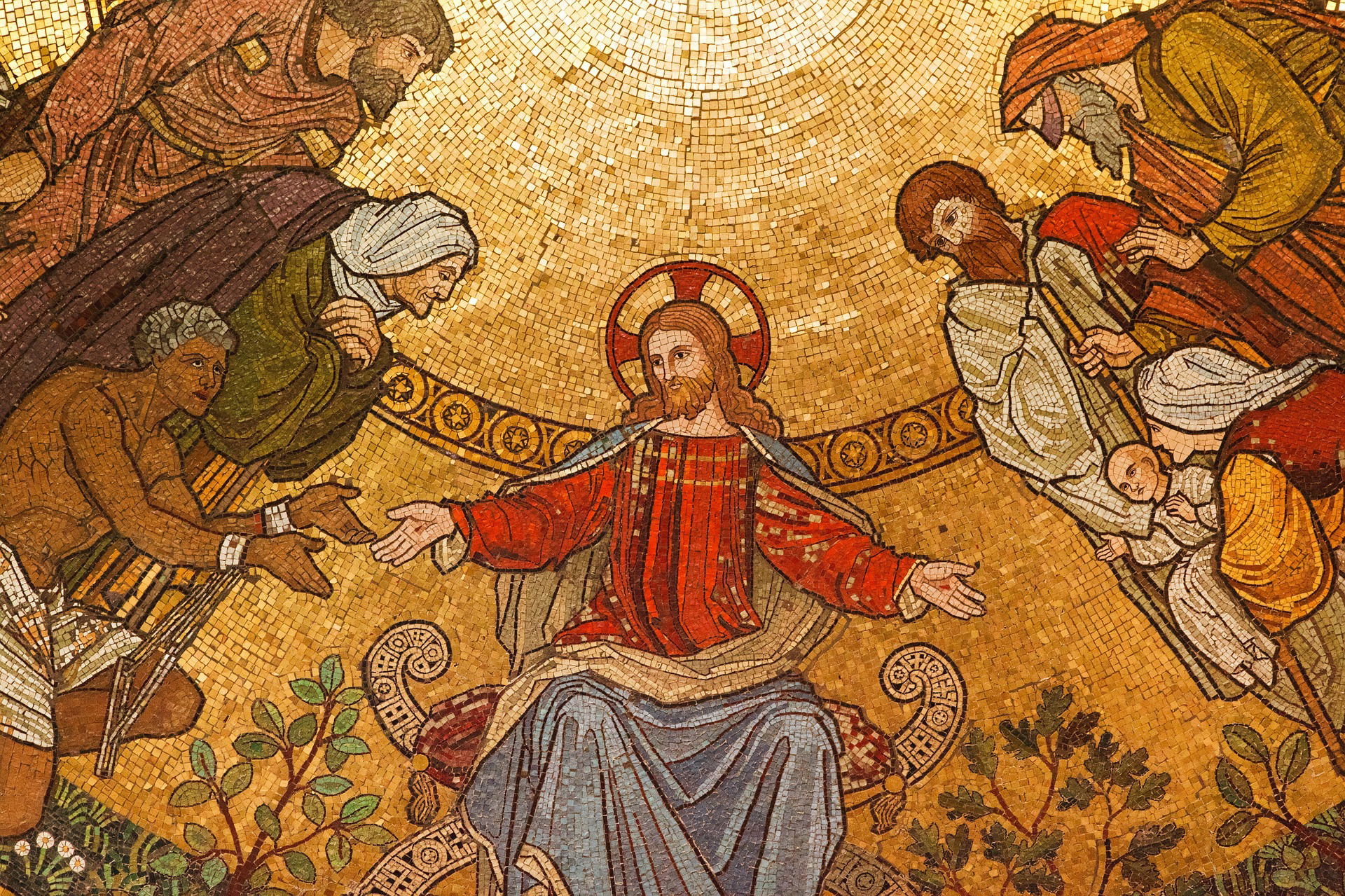Nehemiah Chapter 2 * On the Move

Nehemiah Chapter 2
To Mex & Back
"On the Move"
I lived in Rosarito in Baja California, for six months. Rosarito was a good-sized town whose population could never be agreed on—40,000? 60,000? 100,000? Usually, I limited my driving to Wal-Mart, a straight shot from my neighborhood, down a bumpy dirt road, and that was as far as I went. One late afternoon, I noticed my right rear car tire going flat. I figured I’d better air it up before the next morning. The trouble was, in order to get to the gas station, I would have to cross over the viaduct bridge near the high school. At five o’clock, students released from school emptied into the main streets, further complicating rush-hour traffic.
To my relief, my brave 11-year-old granddaughter, Chel, volunteered to go with me to the gas station. She knew Grandma was nervous about driving over the bridge, although “nervous” didn’t even come close to how I felt. “Dreadfully afraid” was more like it. In Nehemiah 2:2. when the king asked why Nehemiah had such a sad face, Nehemiah “became dreadfully afraid.” Because he knew if he told the King the truth about his sadness, he could lose his life. I guess I was afraid I’d lose my life too, competing with everyone trying to merge into five o’clock traffic. And lucky me, it turned out to be everything I imagined. I screamed all the way over the bridge and down the hill as Chel patted me on the shoulder and spoke calmly. “It’s okay, Grandma. Breathe. You’re almost there. It’s okay.”
Three blocks past the bridge I rolled into the gas station and made clumsy hand gestures to the Spanish attendant that my tire needed air. From there I had to exit two ramps notoriously known for lane closures and construction. When I turned onto the Wal-Mart road, I began to relax; I was nearly home.
“We did it! We did it!” I smiled jubilantly at Chel. Feeling safe, my heart still pounding hard, I apologized for acting so crazy. “It was worse,” I said, “than my brother taking me on the Ferris wheel, and when we stopped at the top, he’d swing our seat back and forth until I was sure I’d fall out. You should’ve heard me scream then.”
Chel said, “You know, Grandma, you need to learn to go further than Wal-Mart. Sometimes you have to get out of your comfort zone." Such a wise young lady.

As I look back at my reluctance to leave Nebraska and adjust to a new environment, I realize God was calling me to move out of the comfort zone of the world (which wasn’t that comforting) and into the comfort zone of His Spirit. Sometimes it takes a life-threatening situation like getting air in your tire to get moving in the right direction. Sometimes leaving the comfort zone means getting out of the fear zone or judgment zone, the ones we create for our own protection. In other words, we don’t fully trust the LORD. With that attitude, we limit what He can do in our life.
One day, after I had returned to Nebraska, I took Ziggy the dog for a morning walk. As I hurried past the corner apartments, I noticed the people on the porches, and the trash in the yards. Everything screamed, “BAD area, keep moving!” Then, the Holy Spirit tapped me on the shoulder and said I was judging the very people whom the LORD had given His life for. “LORD,” I prayed, “help me ignore this critical feeling and remember that You went to “bad” areas that others avoided. You loved the unlovable; You healed people with demonic spirits, ate with tax collectors, and invited others to dare judge You.” I realize now that Christ was creating a new awareness in me, helping me rebuild the crumbled spiritual walls that make it easy for unwanted traits to go unnoticed. Thank You, Jesus, for helping me to find my way back to Your comfort zone.
NEH 2: DAY 5 READY, START, READ!

Section I: Nehemiah Steps Out in Faith
1 And it came to pass in the month of Nisan, in the twentieth year of King Artaxerxes, when wine was before him, that I took the wine and gave it to the king. Now I had never been sad in his presence before. 2 Therefore the king said to me, “Why is your face sad, since you are not sick? This is nothing but sorrow of heart.”
So I became dreadfully afraid,
Throughout his 122 days of praying and fasting, Nehemiah managed to keep his sadness to himself, his concern about Jerusalem and the broken wall. On this day, the king detected something wrong. Now, the king’s cupbearer knew the rules. 1) “Never, ever show up to work with a sad face. If you looked sad or distressed after taking a drink of wine before offering it to the king, he might think you planned to poison him. 2) Persian kings, like Artaxerxes, believed servants, slaves, or subjects should consider it a privilege and joy to be in the king’s presence. If a servant showed any signs of being unhappy, the king considered it an insult, and then, woe to that servant!
3 and said to the king, “May the king live forever! Why should my face not be sad, when the city, the place of my fathers’ tombs, lies waste, and its gates are burned with fire?”
4 Then the king said to me, “What do you request?”
So I prayed to the God of heaven.
5 And I said to the king, “If it pleases the king, and if your servant has found favor in your sight, I ask that you send me to Judah, to the city of my fathers’ tombs, that I may rebuild it.”
Nehemiah addressed the king in the proper respectful manner of wishing him a long life. To not address him in such a way would have been drastic. End of Nehemiah’s story. Notice, he had a moment between breaths to pray before answering the king. However, instead of saying he wanted to rebuild Jerusalem, Nehemiah found common ground with the king by discussing his concern for his fathers’ tombs and that he wanted to go to the city and rebuild it. Surprisingly, the king was okay with Nehemiah’s request or perhaps he thought it was time that Jerusalem was rebuilt. Regardless of what the king thought, Nehemiah knew God was really in charge; He was the decision-maker, the heart-changer.
6 Then the king said to me (the queen also sitting beside him), “How long will your journey be? And when will you return?” So it pleased the king to send me; and I set him a time. 7 Furthermore I said to the king, “If it pleases the king, let letters be given to me for the governors of the region beyond the River, that they must permit me to pass through till I come to Judah, 8 and a letter to Asaph the keeper of the king’s forest, that he must give me timber to make beams for the gates of the citadel which pertains to the temple, for the city wall, and for the house that I will occupy.” And the king granted them to me according to the good hand of my God upon me.
All those months of planning paid off. Nehemiah boldly explained what he needed and why he would need the letters and lumber. This, no doubt, also impressed the king, who appointed Nehemiah to the position of governor, as well as providing him a military escort.
9 Then I went to the governors in the region beyond the River, and gave them the king’s letters. Now the king had sent captains of the army and horsemen with me. 10 When Sanballot the Horonite and Tobiah the Ammonite official heard of it, they were deeply disturbed that a man had come to seek the well-being of the children of Israel.
Meanwhile, Sanballat the Horonite and Tobiah the Ammonite, who made their living being lazy and taking advantage of the Jews, knew before Nehemiah told anyone what his plans were. According to David Guzik's commentary in www.enduringword.com, these men were Jews. Tobiah was a Jewish name, and associated with the high priest's family; Sanballat was connected through marriage. Yet, they opposed Nehemiah's plan, and would continue to do so, right up to Chapter 13.
Section II: Accessing the Situation
11 So I came to Jerusalem and was there three days. 12 Then I arose in the night, I and a few men with me; I told no one what my God had put in my heart to do at Jerusalem; nor was there any animal with me, except the one on which I rode. 13 And I went out by night through the Valley Gate to the Serpent Well and the Refuse Gate, and viewed the walls of Jerusalem which were broken down and its gates which were burned with fire. 14 Then I went on to the Fountain Gate and to the King’s Pool, but there was no room for the animal under me to pass. 15 So I went up in the night by the valley, and viewed the wall; then I turned back and entered by the Valley Gate, and so returned.
Nehemiah still wasn’t ready to tell anyone the reason behind his trip. After a four-month journey to reach Jerusalem, he took three days off, perhaps to rest and settle in before his assessment of the walls. Then, he went out secretly, taking a few of his men with him. The path was strewn with so much rubble and so narrow, he had to leave his “animal” behind and finish his inspection on foot. Check the map (see Chapter 3, Class Notes) to trace Nehemiah’s steps starting and ending at the Valley Gate.
Section III: Facing Opposition
16 And the officials did not know where I had gone or what I had done; I had not yet told the Jews, the priests, the nobles, the officials, or the others who did the work. 17 Then I said to them, “You see the distress that we are in, how Jerusalem lies waste, and its gates are burned with fire. Come and let us build the wall of Jerusalem, that we may no longer be a reproach.” 18 And I told them of the hand of my God which had been good upon me, and also of the king’s words that he had spoken to me.
So they said, “Let us rise up and build.” Then they set their hands to this good work.
Finally, Nehemiah tells the Jews and officials about his plan. Because they were already suffering from reproach and shame over the broken walls and gates, they didn’t need much convincing to rebuild. In fact, they were eager to start, “setting their hands to this good work.”
19 But when Sanballat the Horonite, Tobiah the Ammonite official, and Geshem the Arab heard of it, they laughed at us and despised us, and said, "What is this thing that you are doing? Will you rebel against the king?
20 So I answered them, and said to them, “The God of heaven Himself will prosper us; therefore we His servants will arise and build, but you have no heritage or right or memorial in Jerusalem.”
Sanballat and Tobiah get their information from sneaking around, listening at keyholes. Now, add Geshem the Ahab to the mix. Apparently, they have high opinions of themselves if they think they can stop the building by ridiculing the people. Nehemiah sets the Three Stooges straight about how the people will benefit because God will prosper them, but as for these hecklers, God won’t give them the time of day.
NEH 2: DAY 6 CLASS NOTES & CONNECTIONS
Chapter 2 looks at the FOUR PRINCIPLES OF PREPARATION that Nehemiah implemented before he even started work on his massive project. How can you relate to them on a spiritual level?
- Praying and waiting go hand-in-hand. We might need to grow, hence the waiting period. This is a testimony of how deep God is.
- Faith. Nehemiah had faith that God would hear his prayer and help him. Faith does not mean sitting back and doing nothing; nor does it mean rushing ahead with a half-thought-out plan. Most of all, faith is not a substitute for careful planning. God honors orderly thinking and a plan.
- Changing hearts is God’s specialty. Don’t try to manipulate people. Let God deal with them. It’s simple and straight-forward. Don’t try to force someone to change.
- Opposition is to be expected.

Praying and Waiting
In our fast-food, fast-paced world today, waiting a few days for the boss’ approval to go ahead with a project can seem like a long time. Imagine waiting 122 days for the answer you needed. God must have chosen Nehemiah for his patience. Even after arriving, in Jerusalem, Nehemiah waited three days before setting out at night to secretly inspect the wall. The good news is after all that time waiting and praying, it only took 52 days to rebuild the wall. 52 days! It’s all about God’s timing, not ours.
Someone is ill and we pray for a quick recovery, and we wait and wait. Maybe that prayer isn’t answered the way we hoped for, but we can’t see what God is doing in the front lines. What we do know from reading scripture and from having faith is that He goes before us. Waiting will always benefit us whether the LORD is sharpening our skills or preparing hearts while setting things in place. There’s always a good reason for waiting.
Nehemiah’s Faith
Remember Nehemiah believed that God heard his S.O.S. cry to restore Jerusalem. He prayed and prepared for 122 days. Since God honors order and plans, it was no wonder the king consented to hear Nehemiah’s request. Nehemiah chose his words carefully (or maybe God chose his words for him) and presented his case in a language that moved the king’s heart. Cities were built by ancestors; tombs were built to honor the ancestors. Tombs, plots of lands, and moving the bones of ancestors are part of the history or culture of the Jewish people and other tribes which inhabited the land.
Nehemiah had no clue what the outcome of his conversation with the king would be. God did.
GOD HONORS THOSE WHO TAKE STEPS OF FAITH.
He protected Nehemiah by softening the heart of the king. Not taking any chances that the trip might be aborted by the same adversaries who caused trouble for Zerubbabel and Ezra, Nehemiah requested letters from the king and governors and other officials granting him and his company permission to travel and permission to obtain lumber and supplies. It wasn’t that Nehemiah didn’t trust God, he did. He also understood God had called him to the task. That made it his responsibility to do all he could to carry it out. Requesting the reference letters was just another way to assure that his adversaries knew he was on a mission from the king. Too bad they were limited by physical sight or they might have seen that Nehemiah was on a mission from God.
Changing Hearts
Have you ever prayed that God would soften someone’s heart or maybe soften your own? In the Old Testament book of Exodus, God gave Pharaoh a stubborn heart. He used Pharaoh to make His power known to all people—Egyptians, Israelites, and generations to come. Back then, the closest thing they had to social media was the real information highway. The dusty trading routes traveled by caravans, soldiers, traders, and families provided the perfect breeding grounds to spread stories of God’s greatness. All the nations would hear what God had done, thus restoring His Name.
God doesn’t need to use anyone or anything to glorify Himself; His acts are for our benefit. In John 12:27, a crowd listens as Jesus shares about His impending death and eternal life.“For this purpose I came to this hour. Father, glorify Your name.” Then a voice came from heaven, saying, 'I have both glorified it and will glorify it again.'” The crowd is in awe. Some say it thundered; others say, “An angel has spoken to Him.” Jesus tells them, “This voice did not come because of Me, but for your sake.”
Whatever He does, He glorifies Himself.
Facing Opposition
Those reference letters Nehemiah carried with him, disturbed the hostile governors because that meant they would no longer be able to steal from the people of Jerusalem. Sanballat and Tobiah knew what was going on before anyone else. They also knew the king backed this project; yet, it didn’t stop them from trying to discourage the rebuilding. Sanballat, Tobiah, and Geshem laughed at the Israelites and implied that Nehemiah was going against the king’s decree.
Funny, that opposition against the rebuilding went back 40 years. Concerned enemies of the Jews told Zerubbabel that they wanted to help. Zerubbabel put his enemies in their place, by basically telling them the same thing Nehemiah told Sanballat and Tobiah: “God knows who we are, but he doesn’t know you. You have no business here.”
Remember if you are called to be a leader or overseer of a project, study Nehemiah’s traits. Beware of opposition. Someone may try to convince you to give up because you’re “crazy” or a “failure.” If God says you are worth His love and worth dying for, who are you going to believe? God knows who you are.
Traits of a Wise Leader
Besides being aware of the four Principles of Preparation, Nehemiah also possessed or had developed traits of a wise leader. He planned the project out before speaking to the king, he knew what supplies he would need, how long he would be gone, and after reaching his destination, he went on a secret mission at night to gain a better understanding of what needed to be done. Then he approached the officials and leaders and people of Jerusalem about the true project. Nehemiah’s success as a leader came from implementing the following principles:
- A wise leader knows his needs, rests, eats well, and takes time with God.
- A leader has to know how things work. He does his homework and knows the people around him and what motivates them.
- He is faithful behind the scenes and involved in projects working with the people.
- A wise leader does not react, he responds.
- Motivation is also a huge factor for the successful completion of a project. Nehemiah had to motivate everyone in the city. As a result, the wall was done in 52 days of actual building. There are two types of motivation: (1) Extrinsic or external motivation rewards a person; (2) Intrinsic appeals to the inner person, challenging them to be recognized for good work or because the end result will benefit the community and families of the laborers. A good leader can use a combination of both. An even better leader will favor intrinsic motivation. How does this apply to rebuilding a spiritual wall, or does it? What would be an intrinsic reward to get you to start rebuilding your spiritual wall?
- Another “Wise Leader” trait. A leader will ask for help in a way that will encourage or excite others to want to help with a project. You know the story of Tom Sawyer who conned his friends into helping paint the fence because he made it look like fun? Well, Nehemiah didn’t want to deceive anyone into thinking that rebuilding this fence would be fun, but he told them what they already knew. The city would continue to suffer reproach without a wall. Having suffered enough already, the priests and Jews were glad to pitch in and help. The key point here is that Nehemiah never intended to do it alone. He knew he had God in his corner, but he wanted to involve those who were living inside Jerusalem as well. The moral here is God also wants us to ask Him for help.
Jesus tells His disciples more than once to “ask in My name.” That’s like giving us a reference letter, similar to the ones Nehemiah carried to show he was on a mission from the king. His enemies knew the consequences of the king if they tried to kill the messenger. Still, it didn’t stop the enemies from ridiculing or trying to intimidate Nehemiah. Compare that to the enemies of Christ. Even though Christ conquered Satan and death, the forces of darkness persist in ridiculing us and trying to intimidate us to keep us from rebuilding our spiritual wall or whatever mission we’re on “in His Name.”
In Luke 18:18-43, after blind Bartimaeus calls out to Jesus, the Son of David, Jesus has His disciples bring Bartimaeus to Him. He asks Bartimaeus, “What would you have me do for you?” I love that He asks us what He can do for us. He wants to help us, and even more, He wants us to tell Him specifically what we need. Be sure to tell Him, and then ask Him what He would have you do for Him.
Journaling * Journaling * Journaling * Journaling * Journaling * Journaling
NEH 2: DAY 7 NEHEMIAH & ME
Jan. 18, 2017 Who’s afraid of Darkness?
I was so blessed as a child, experiencing the presence of Jesus and God in my life. As a child, I wrote letters to God and believed an angel delivered them. Little did I know my father played the angelic postman whenever he found an envelope addressed to “God,” tucked into the light switch in the hallway, across from my room.
I also had a bedtime phobia about the darkness. My brother, Tom, teased me about tarantulas under my blankets, monsters under my bed, and the midnight visits by Dracula and the Blob. Every night I followed the same old routine. Frightened to go upstairs by myself, I sent Pixie, our little dog up first, pushing her to the top of the stairs. Upstairs, I ‘d scout for monsters in the three bedrooms, under each bed, the closet, the bathroom, the sewing closet, then repeat two or more times in case a monster had ran into another room when my back was turned. LORD, why didn’t I just send You first?
The study of Your word and Nehemiah reminds me that You do go first to explore the darkness. You are Light and in You there is no darkness. Our battle is not with flesh and blood, but against the powers of darkness (Eph.6:10). Speaking of Nehemiah, it seems like he was always assessing and praying; and so should we. Our prayer should be something like this: “Go with me, LORD, to assess the damage of the walls that makes me vulnerable to the enemy’s attacks. Go with me, LORD, and show me how to repair the gaps and holes to keep the darkness out. I get distracted by pain, by shopping, by indifference. My rebuilding takes a back burner. I make excuses for not rebuilding, and then the enemy attacks. But wait . . . Jesus overcame the darkness.
Today, if I hear Your voice, LORD, let me not harden my heart.
Jan. 20, 2017 Two months after I arrived back in Nebraska
I started feeling anxious trying to nail down travel dates to return to Rosarito for a visit. My mind was all over the place as usual. Solution? Re-read Nehemiah and study notes. Nehemiah knew he would need lodging, transportation, etc. I get it. Instead of worry, I just need to assess my options. So the answers to my questions are simple. Prep and Prayer. When I forget to ask God for His help, I get anxious, thinking about how to accomplish plans on my own. Everything works out better if I let Jesus be my travel agent. It took Nehemiah four months of praying before he was ready to approach the king, then he presented his request, and outlined what he needed. “If it pleases the king,” he said. I really liked what my Nehemiah class notes said: “When God begins to build that burden in your heart, think about “how” it will happen.
• “God honors a plan.” Wise-planning on my part gives the LORD more opportunity to accomplish the work, never less . . .
• “When you wait on the LORD in prayer, you are not wasting time, but investing it.”
March 17, 2017 Prayer, Planning and Nehemiah
Reading my journal from Dec. 30, 2016, the beginning of sorting my rubble of boxes and bins. I still have a long way to go. I woke up, my mind busy, busy, with all I “need” to do today. My thoughts skitter back and forth like a cockroach in a dark kitchen or a mouse looking for crumbs. Relax. What I really “need” is to remember God goes before me, thru Christ. His Holy Spirit is continually with me. I feel Him within me, a strong reminder of how much He loves us. And now the time has come for me to do what? Focus on laundry, cleaning, exercising? As I learned in the Nehemiah study, the LORD honors orderly thinking and a plan (from Neh. Notes, Aug. 7, 2016 covering chapter 2:4-10.) Wise planning on my part gives the LORD more opportunity to accomplish work, never less. Wise planning includes praying and waiting.
Today, if I will hear Your voice, let me not harden my heart, or lose my heart in disarray or focus only on my physical “needs” list.
Sept. 1, 2017 Sadness & Joy & Remembrance
Psalm 16, although categorized as a Psalm of Lamentations, I felt praise and joy in the words, not sorrow. “O my soul, you said to the LORD, “You are my LORD; my goodness is nothing apart from You (because without you, I am nothing). As for the saints who are on the earth, (God said) “They are the excellent ones in whom is all my delight.”
Read Nehemiah 2 and reflected on Nehemiah who was ready to ask the king for time off, and for permission to restore the wall of Jerusalem. If it had been me, I would’ve been ready to quit my job in rebellion against authority if the king had not given me the time off.
“Now I had never been sad in his presence before.”
I really hadn’t thought of what those words meant in the case of Nehemiah and the king. I know he was expected to be happy before the king. Show up with a smile. Just think, Nehemiah had spent four months fasting, yet the king hadn’t noticed? I imagine there were times of non-fasting as well. Nehemiah fasted to present his body as an offering to God. As a result of the fasting, perhaps Nehemiah radiated health inside-out. For some reason, though, the day Nehemiah planned to see the king, something about his appearance gave him away, because the king asked why Nehemiah was sad.
Oct. 14, 2017 Burning Eyes, Burning Heart
Dear LORD, when I think of Nehemiah and the rebuilding of the wall and the reason for the wall, and how Jesus wept for Jerusalem, what He saw that we didn’t see. LORD, my heart aches and my eyes fill with tears. I suppose, like Nehemiah felt to hear the news about the discouraged Jews. Is that it, LORD? Why do you keep pointing this out to me? Why am I so affected? Can You really use me in a big way to help accomplish Your purpose? Restoring our spiritual wall?
Let me not forget when You have a purpose to accomplish, it will be accomplished, and I would be honored if You use me. After all, I am just a small fish in Your basket. Bless me and I will feed many, because You, LORD, feed the world, heal the people, change our hearts, and can transport us immediately out of trouble to a safe place, just like You did for the disciples in the midst of the raging storm on the Sea of Galilee.
Open my eyes, my ears, my heart, and my mouth.
Oct. 26, 2017 The Jesus Connection
What have I learned or taken note of from God’s teachings today after reading John 8? My mind’s responses are often like the Pharisees who responded to Jesus with taunts, saying they knew better, and who was He to think or call Himself the Son of God.
Reminds me of Sanballat, Nehemiah’s enemy. What I loved in John 8 was Jesus warning us that Satan is the father of lies. I realized Jesus knew Satan personally. It wasn’t just hearsay from a third party. Jesus spoke from personal experience (40 days in the Wilderness) and personal knowledge, so I better take what Jesus says seriously because Christ does not lie
Oct. 31, 2017 2nd Hip Replacement
As I prepare for my left hip appointment with Dr. Gallentine, I read Psalm 51, David asking for repentance, and praising God. Also 51 mentioned that God should “Build the walls of Jerusalem.” Aha! THE NEHEMIAH CONNECTION!
Nov. 7, 2017 Stepping Outside the Comfort Zone.
I started reading Nehemiah 1-4, then realized I had forgotten my lap pillow to support my Bible and make it easier to write. "But, LORD, I just got comfortable,” I said after fixing my coffee and arranging pillows on my big chair, and grabbing pens.
Sometimes, God calls us to get up and move spiritually out of our comfort zone. I observed that missionaries are frequently called after they just get settled into a church or new home, then it’s time to move on. But, of course, they expect this since they serve the LORD, and their “soul” purpose is to do His bidding. They abide in Him. What about me? I often forget that I said, “Use me, LORD,” as I strive to serve Him in a “comfortable” routine or house.
Those Israelites who were neglecting God were called by the LORD to leave their comfort zone, and were marched into captivity for 70 years. But God even made their captivity pleasant and comfortable. After their exile, they moved back to Jerusalem and discovered what shambles it was in. Under Nehemiah’s leadership, they toiled and sifted through the rubbish. They worked together to restore the wall; at the same time, they guarded what they had already restored. What about me, LORD? Do I need to leave the comfort of my home, my routine TV watching so I can learn from You and serve You? But I’m comfortable doing nothing. NOT!! Jonah was comfortable in the shade of a vine until the LORD prepared a worm to eat the leaves. Jesus had no place to lay His head. Paul rarely had a comfortable place since he spent much of his ministry in jail or in the midst of storms.
LORD, don’t let me be a captive of my comfort. God told Amos the prophet how He would call those who were captive back home to restore Jerusalem. Not just the Israelites, but the Gentiles as well. In Amos 9:11-14, God promises, “On that day I will raise up the tabernacle of David, which has fallen down, and repair its damages; I will raise up its ruins, and rebuild it as in the days of old; that they may possess the remnant of Edom, and all the Gentiles who are called by My name, says the LORD who does this thing … I will bring back the captives of my people.”
Amos was a sheep breeder, called to prophesize during the reign of Jeroboam and his son (Kings of Israel); and Uzziah and his son, (Kings of Judah). He prophesized about 33 years BEFORE the fall of Jerusalem by the Assyrians; about 100 years prior to Nehemiah.
Nov. 21, 2017 Keeping My Vows 6 Days After Left Hip Replacement
At last! I’m feeling joyful. It’s like waking up for the first time. When I was sluggish, I felt so far from You, O LORD, separated from Your joy and strength. And then You surprised me with a verse after I got home from the hospital. I randomly turned to Nehemiah 9:5.
“Stand up and bless the LORD your God forever and ever!”
And so I stood without my walker.
Psalm 61
Hear my cry, O God; Attend to my prayer. From the end of the earth I will cry to You, when my heart is overwhelmed, (This verse was written for me; “Overwhelmed” is my middle name). Lead me to the rock that is higher than I, for You have been a shelter for me, a strong tower from the enemy. I will abide in Your tabernacle forever; I will trust in the shelter of Your wings. For You, O God, have heard my vows . . . So I will sing praise to Your name forever that I may daily perform my vows.
Whoops, “What vows?” Did I miss something? The answer is right in front of me: If I say I will “trust in the shelter of Your wings,” that makes it a vow, right, LORD? Earlier I was thinking, “I’ll finish putting the shower stool together, and not bother Cam.” Then that inner voice said, “No, you should remind Cameron. It is a vow he made that he would return and finish. Don’t help him break his vow; help him by allowing him to finish.” Same goes for me, LORD. If I promise to trust in You, I’d better trust in You completely. That is my vow. Plus, You’ve promised us that You’ll help us, so I should allow You to help. I shouldn’t tell You that I don’t need Your help, especially when You want to help. Like my friend, Ret says, “When someone offers to help, say 'Thank you.'” So, thank you, LORD! And that’s Psalm 61.
Nov. 22, 2017 NEWS FLASH! JESUS IS THE WALL!
I went thru my journals last night, labeling Neh. passages and chapters. This morning, (one week after left hip replacement) read Colossians 1. Very much connected Christ as firstborn, who rules, reigns and is heir over all creation. He is the Creator and He is Creation.
Three things stood out:
- Christ was the firstborn reconciled in the body of His flesh through death.
- He was reconciled to present us holy, blameless, and above reproach in His sight. There’s that word again. “Reproach” or “above reproach.” In Nehemiah, the walls were rebuilt so the city could be without reproach, without sin, sorrow. Paul explained the spiritual connection to our bodies, blameless and holy.
- Paul also made reference to Christ’s physical body. (Col. 1:21) And you, who once were alienated and enemies in your mind by wicked works, yet now He has reconciled . . . in the body of His flesh thru death. How cool is that?! In other words, Jesus is the Wall; JESUS is THE WALL! Our Wall! That completely, totally blows me away.
JESUS is THE WALL!
Our perfect protection.
His message, "More love please."

YOUR TURN! Open your journal and go for it! Write whatever is on your heart or mind.
NEH 2: DAY 8 PRINCIPLES INTO PRACTICE
INSPIRATIONAL VERSE: NEH 2:5 And I answered the king, “If it pleases the king and if your servant has found favor in his sight, let him send me to the city in Judah where my fathers are buried so that I can rebuild it.”
Ask and you shall receive. Do you recall the letters Nehemiah collected in advance of his expedition giving him permission to obtain supplies and travel safely through the land? God provided everything Nehemiah would need to rebuild the wall, even the transportation and military escort and the letters of reference. Remember, Christ told the disciples whatever you ask in My name, you’ll receive. He provides everything we need for our spiritual journey and rebuilding of our wall. His Name is our reference letter.
Nehemiah was on a mission for the king. When we want to serve Christ in whatever capacity He chooses or find ourselves on a mission to accomplish His purpose, then we, too, are on a mission for the King. Just as the letters disturbed the hostile governors because that meant they would no longer be able to steal from Jerusalem, our special “letter of reference” from Christ will anger the hostile forces who will no longer be able to steal our peace and our hope.

NO. 2 INSPIRATIONAL VERSE: NEH 2:10 When Sanballat the Horonite and Tobiah the Ammonite official heard of it, (“Nehemiah is going to do what?! Rebuild the wall?”) they were deeply disturbed that a man had come to seek the well-being of the children of Israel.
Perhaps this is one of the key verses in Nehemiah, and easily overlooked as you take in other verses. Nehemiah was a man recognized by his enemies as a "do-gooder," a man not in the game of rebuilding for a profit. If he was, then he'd be on Tobiah and Sanballat's side instead of helping the children of Israel. This is why Sanballat and Tobiah were "deeply disturbed." You can bet they would approach other governors in the region to rally against Nehemiah. If the wall was rebuilt, it would seriously damage the commerce and control these enemies flaunted over the "children of Israel." Interestingly, another verse voices the same concerns.
THE JESUS CONNECTION
The Pharisees and religious leaders in the time of Jesus were also very angry that "a man had come to seek the well-being of the children of Israel." or in the words of Jesus, "...the Son of Man has come to seek and to save that which was lost. (Luke 19:10)" In their thinking, Jesus was trouble. He defied tradition. Multitudes of poor and afflicted people followed him. Before long, He'd win them all to His side, and the Pharisees would lose their power over the people they cheated.

Chapter 2 covered Nehemiah's Principles of Preparation: (1) Praying and waiting go hand-in-hand. (2) Faith. (3) God’s specialty is changing the hearts of the people. (4) Expect opposition. Paul said don’t mediate on negative or hopeless things, but focus on things that are uplifting and positive. Love God, love yourself, love your neighbor.
(Phil. 4:6-8). Finally, brethren, whatever things are true, whatever things are noble, whatever things are just, whatever things are pure, whatever things are lovely, whatever things are of good report; if there is any virtue, and if there is anything praiseworthy—meditate on these things.
Congratulations on finishing Chapter 2!
This chapter has certainly been a challenge for me. Not so much when I was writing, but just reformatting and editing to put on this website. Again and again, I lost the edited version, and had to start over. And then, when searching for graphics representing the "cluttered path" Nehemiah faced, I realized our own spiritual path is sometimes strewn with clutter, littered with old ideas and fears, you name it. Now, we can all move on to Chapter 3, a look at how the gates of Jerusalem are connected to the life of Jesus.



